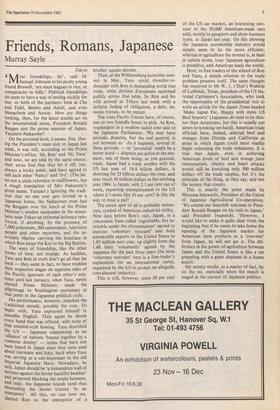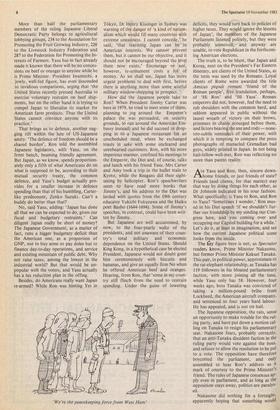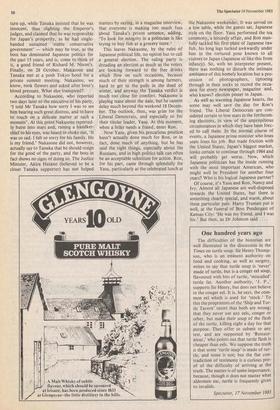Friends, Romans, Japanese
Murray Sayle
Tokyo Most friendships,. Sir', said Dr Samuel Johnson to his pushy young friend Boswell, 'are mere leagues in vice, or conspiracies in folly.' Political friendships do seem to have a way of ending stickily for one or both of the partners: look at Che and Fidel, Benito and Adolf, and even Menachem and Anwar. How are things looking, then, for the latest double act on the international scene, President Ronald Reagan and the prime minister of Japan, Yasuhiro Nakasone?
On the personal level, it seems, fine. Dur- ing the President's state visit to Japan last week, it was stilt, according to the Prime Minister's office, 'Hi, Ron' and 'Hi, Yasu' and now, we are told by the same source, their wives find that they hit it off, too, always a tricky point, and have agreed to call each other 'Nancy' and 'Ivy'. (The lat- ter not a snide reference to wallflowers, but a rough translation of Mrs Nakasone's given name, Tsutako.) Ignoring the tradi- tion that no one ever gets invited to a Japanese home, the Nakasones even had the Reagans over for lunch at the Prime Minister's modest weekender in the moun- tains near Tokyo an informal intimacy rein- forced, if anything, by the presence of 7,000 policemen, 200 cameramen, television people and other reporters, and the in- evitable Marine carrying the briefcase in which Ron keeps the Key to the Big Button.
The ways of friendship, like the other forms of love, are strange. As buddies, Yasu and Ron in truth don't go all that far back — they seem in fact, to have trodden their respective stages on opposite sides of the Pacific ignorant of each other's exis- tence until last January, when Yasu, newly elected Prime Minister, made the Pilgrimage to Washington customary at that point in the Japanese political cycle. His performance, however, smashed the traditional mould, possibly for ever. To begin with, Yasu expressed himself in Passable English. Then again he shook every hand that was offered, with nune of that oriental-style bowing. Yasu described the US — Japanese relationship as an 'alliance' of nations 'bound together by a common destiny' — terms that have not been heard in Japan since they were used about Germany and Italy, back when Yasu was serving as a sub-lieutenant in the old Imperial Japanese Navy. Nowadays, he said, Japan should be 'a tremendous wall of defence against the Soviet backfire bomber' and proposed blocking the straits between, and near, the Japanese islands (and thus blockading the Soviet Union) 'in an emergency'. All this, we can now see, alerted Ron to the emergence of a brother square-shooter.
Then, at the Williamsburg economic sum- mit in May, Yasu stood shoulder-to- shoulder with Ron in demanding world free trade, while devious Europeans squirmed guiltily across that table. So Ron and his wife arrived in Tokyo last week with a definite feeling of obligation, a debt, be- tween friends, to be repaid.
The trans Pacific friends have, of course, one or two friendly bones to pick. As Ron, resplendent in a swallow-tailed coat said to the Japanese Parliament: 'We may have periodic disputes, but the real quarrel, is not between us.' As it happens, several of these periodic — or 'perennial' might be a better word — disputes are active at the mo- ment, one of them being, as you guessed,
trade. Japan had a trade surplus with the US last year of 19.8 billion dollars, is
shooting for 25 billion dollars this year, and may touch 30 million dollars in the witching year 1984. Is Japan, with 2.5 per cent out of work, exporting unemployment to the US where it's more like 10 per cent? Is this the way to treat a pal?
The sorest spot of all is probably motor- cars, symbol of American industrial virility.
Nine days before Ron's visit, Japan, in a concession Yasu called 'regrettable, but in- evitable under the circumstances' agreed to exercise 'voluntary restraint' and hold automobile exports to the United States to 1.85 million next year, up slightly from the
1.68 limit 'voluntarily' agreed by the Japanese for the past three years (the term 'voluntary restraint' here is a free-trader's euphemism for an international cartel, organised by the US to protect an allegedly convalescent industry).
This is still, however, some 20 per cent of the US car market, an interesting con- trast to the 30,000 American-made cars sold, mostly to gangsters and show-business types. in Japan last year. On this showing the Japanese automobile industry would simply seem to be the more efficient, whereas in agriculture the reverse is, at least in calorie terms, true: Japanese agriculture is primitive, and American leads the world.
Here, to free traders of the school of Ron and Yasu, a simple solution to the trade problem presents itself. The same thought has occurred to Mr W. J. (`Dub') Waldrip of Lubbock, Texas, president of the US Na- tional Cattlemen's Association, who took the opportunity of the presidential visit to write an article for the Japan Times headed 'Make Japan Fat, Happy with more US Beef Imports' (Japanese do tend to be thin- ner than Americans, but this is usually put down to working too hard). American trade officials have, indeed, selected beef and oranges from Florida and California as areas in which Japan could most readily begin redressing the trade imbalance. It is true that Japan, even in achieving American levels of beef and orange juice consumption, obesity and heart attacks would still be knocking only 500 million dollars off the trade surplus, but it's the principle of the thing, as they say, and not the money that counts.
This is exactly the point made by Shizuma Imawochi, President of the Union of Japanese Agricultural Co-operatives. 'We extend our heartfelt welcome to Presi- dent Ronald Reagan on his visit to Japan,' said President Iwamochi. 'However, I would like to make it quite clear from the beginning that if he wants to take home the opening of the Japanese market for American farm products as a 'souvenir' from Japan, he will not get it. The dif- ference in the power of agriculture between Japan and the United States is like a rat grappling with a giant elephant in a Sumo match'.
My money would, as a matter of fact, be on the rat, especially when the match is staged in the context of Japanese politics.
More than half the parliamentary members of the ruling Japanese Liberal Democratic Party belongs to agricultural lobbying groups, 234 to the Association for Promoting the Fruit Growing Industry, 226 to the Livestock Industry Federation and 287 to the Federation for Promoting the In- terests of Farmers. Yasu has in fact already made it known that there will be no conces- sions on beef or oranges to anyone while he is Prime Minister. President lwamochi, a jowly, well-fed figure, has even descended to invidious comparisons, urging that 'the United States recently pressed Australia to exercise voluntary restraint on beef ship- ments, but on the other hand it is trying to compel Japan to liberalise its market for American farm products. Thus the United States cannot convince anyone with its practice.'
That brings us to defence, another nag- ging rift within the lute of US-Japanese amity. 'The defence of freedom should be a shared burden', Ron told the assembled Japanese legislators, with Yasu, on the front bench, beaming friendly agreement. But Japan, as we know, spends proportion- ately only a fifth of what Americans do on what is supposed to be, according to their mutual security treaty, the common defence, and Yasu's budget actually pro- vides for a smaller increase in defence spending than that of his bumbling, Carter- like predecessor, Zenko Suzuki. Can't a buddy do better than that?
No, said Yasu, adding: 'Japan has done all that we can be expected to do, given our fiscal and budgetary restraints.' Can diligent Japan really be short of money? The Japanese Government, as a matter of fact, runs a bigger budgetary deficit than the American one, as a proportion of GNP, not to buy arms or pay doles but to finance day-to-day operations, and service and existing mountain of public debt. Why not raise taxes, among the lowest in the industrial world? But that would be un- popular with the voters, and Yasu actually has a tax reduction plan in the offing.
Besides, do Americans really want Japan re-armed? While Ron was hinting Yes in Tokyo, Dr Henry Kissinger in Sydney was warning of the danger of 'a kind of nation- alism which would fill many countries with extreme uneasiness. I cannot concede,' he said, 'that rearming Japan can be in American interests. We cannot prevent them, but it cannot be our objective, and it should not be encouraged beyond the level there now exists.' Encourage or not, however, re-armament costs a lot of money. As we shall see, Japan has more urgent problems to deal with first, before there is anything more than some wistful military window-shopping in prospect.
How did the Japanese people take to Ron? When President Jimmy Carter was here in 1979, he tried to meet some of them, planning to jog around the Emperor's palace (he was persuaded, on security grounds, to run around the American Em- bassy instead) and he did succeed in drop- ping in to a Japanese restaurant for an unscheduled meal, where he exchanged toasts in sake with some uncleared and unrehearsed customers. Ron, with his more imperious manner, confined his meetings to the Emperor, the Diet and, of course, talks and lunch with his friend Yasu. Mrs Carter and Amy took a trip in the bullet train to Kyoto, while the Reagans did their sight- seeing by helicopter. Ron's speechwriters seem to have read more books that Jimmy's, and his address to the Diet was larded with quotes from the 19th century educator Yukichi Fukuzawa and the Haiku poet Basho (1644-1694). Some of Jimmy's speeches, in contrast, could have been writ- ten by Jimmy.
But Japanese are well accustomed, by now, to the four-yearly waltz of the presidents, and not unaware of their coun- try's total military and economic dependence on the United States. Should King Kong, in a hypothetical case be elected President, Japanese would not doubt greet him ceremoniously with biscuits and bananas, and give an equally firm No when he offered American beef and oranges. Hearing, from Ron, that 'some in my coun- try still flinch from the need to restrain spending. Under the guise of lowering
'We're the peacekeeping force from West Ham'
deficits, they would turn back to policies of higher taxes. They would ignore the lessons of Japan', the members of the Japanese Parliament listened politely, but they were probably unmoved, and anyway are unable, to vote Republican in the forthcom- ing American elections.
The truth is, to be blunt, that Japan and Korea, next on the President's Far Eastern itinerary, are clients of the United States, as the term was used by the Romans. Loyal clients of Rome were awarded the title Amicus populi romani 'friend of the Roman people', free translation, perhaps, of 'Hi Ron' and 'Hi Yasu'. Roman emperors did not, however, feel the need to rub shoulders with the common herd, and seldom appeared in public without the laurel wreath of victory on their brows, prisoners in chains scourged before them, and lictors bearing the axe and rods — none- too-subtle reminders of their power, with which it is tempting to compare the press photographs of manacled Grenadian bad guys, widely printed in Japan. In not being hail-fellow-well-met, Ron was reflecting no more than patent reality.
Are Yasu and Ron, then, sincere down-
home friends, or just friends of state? Friends (and clients, for that matter) stay that way by doing things for each other, as Dr Johnson indicated in his sour fashion. What specifically, is Yasu to Ron, and Ron to Yasu? 'Sometimes I wonder,' Ron mus- ed in his Diet speech 'if we shouldn't fur- ther our friendship by my sending our Con- gress here, and you coming over and occupying our Capitol building for a while.' Let's do it, at least in imagination, and see how the current Japanese political scene looks from the inside.
The key figure here is not, as Spectator readers know, Prime Minister Nakasone, but former Prime Minister Kakuei Tanaka. This pair, in political power, approximate to the rat-elephant relationship, as Tanaka has 119 followers in his bloated parliamentary faction, with more joining all the time, while Yasu only has 58. However, four weeks ago, boss Tanaka was convicted of taking a million-pound bribe from Lockheed, the American aircraft company, and sentenced to four years hard labour. He has appealed, and is out on bail.
The Japanese opposition, the rats, sense an opportunity to make trouble for the rul- ing party, and have put down a motion cal- ling on Tanaka to resign his parliamentary seat. Nakasone fears, probably correctly, that an anti-Tanaka dissident faction in the ruling party would vote against the boss, and refuses to allow the resolution to be put to a vote. The opposition have therefore boycotted the parliament, and only assembled to hear Ron's address as a mark of courtesy to the Prime Minister's friend. The rules of Japanese consensus al9' ply even in parliament, and as long as the opposition stays away, politics are paralys- ed.
Nakasone did nothing for a fortnight, apparently hoping that something would
turn up, while Tanaka insisted that he was innocent, thus slighting the Emperor's judges, and claimed that he was responsible for Japan's prosperity, as he had single- handed sustained 'stable conservative government' — which may be true, as the boss has dominated Japanese politics for the past 15 years, and is, come to think of it, a good friend of Richard M. Nixon's. Finally, on 28 October, Makasone and Tanaka met at a posh Tokyo hotel for a private summit meeting. Nakasone, we know, took flowers and asked after boss's blood pressure. What else transpired?
According to Nakasone, who reported two days later to the executive of his party, 'I told Mr Tanaka how sorry I was to see him bearing such great distress, and to have to touch on a delicate matter at such a moment'. At this point Nakasone reported- ly burst into tears and, raising a handker- chief to his eyes, was heard to choke out, `It was so sad. I felt so sorry for his family. He is my friend.' Nakasone did not, however, actually say to Tanaka that he should resign for the good of the party, and the boss in fact shows no signs of doing so. The Justice Minister, Akira Hatano (believed to be a closet Tanaka supporter) has not helped matters by saying, in a magazine interview, that everyone is making too much fuss about Tanaka's prison sentence, adding, `To look for integrity in a politician is like trying to buy fish at a grocery store.'
This leaves Nakasone, by the rules of Japanese political life, no option but to call a general election. The ruling party is dreading an election as much as the voters are looking forward to the free drinks which flow on such occasions, because much of their strength is among farmers, hard to get to the polls in the dead of winter, and anyway the Tanaka verdict is much too close for comfort. Nakasone is playing tease about the date, but he cannot delay much beyond the weekend 18 Decem- ber. The outlook, then, was grim for the Liberal Democrats, and especially so for their titular leader, Yasu. At this moment, when a feller needs a friend, enter Ron.
Now Yasu, given his precarious position hasn't actually done much for Ron, or in fact, done much of anything, but he has said the right things, especially about the Russians, and in high politics talk can often be an acceptable substitute for action. Ron, for his part, came through splendidly for Yasu, particularly at the celebrated lunch at
the Nakasone weekender. It was served on a low table, while the guests sat, Japanese style on the floor. Yasu performed the tea ceremony, a leisurely affair, and Ron man- fully tackled his first plate of Japanese raw fish, his long legs tucked awkwardly under him in the tortured pose known to all visitors to Japan (Japanese sit like this from infancy). So, with no interpreter present, there was nothing to disturb the intimate ambiance of this homely location but a pro- cession of photographers, tiptoeing through in their socks to record the occa- sion for every newspaper, magazine and, who knows? election poster in Japan.
As well as warming Japanese hearts, the scene may well save the day for Ron's friend. The Liberal Democrats are con- sidered certain to lose seats in the forthcom- ing elections, in view of the unpropitious circumstances in which they have been forc- ed to call them. In the normal course of events, a Japanese prime minister who loses seats loses his job. But trade friction with the United States, Japan's biggest market, looks certain to continue through 1984 and will probably get worse. Now, which Japanese politician has the inside running with the most important American, who might well be President for another four years? Who is his logical Japanese partner?
Of course, it's Yasu and Ron, Nancy and Ivy. Almost all Japanese are well-disposed towards the United States, but there is something clearly special, and warm, about these particular pals. Harry Truman put it well, at the funeral of Boss Pendergast of Kansas City: 'He was my friend, and I was his.' But then, as Dr Johnson said ....




























































 Previous page
Previous page